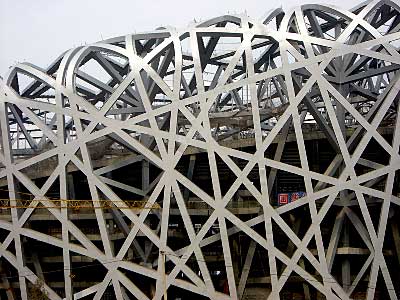
SJA member MATTHEW ENGEL is the sports columnist of the Financial Times. He is well-know for his clear-sighted take on sporting issues. Here is an extract from his Saturday column on what awaits London
There have been 11,000 individual triumphs and disasters, but overall it should be possible to declare the Olympics (pending any last-minute disaster) as something close to an unalloyed success for the third time running.
The Chinese government’s ability to solve problems by throwing unlimited money, edicts and manpower at them, has certainly had an impact in ensuring the Games’ success, and those luxuries will not be available to Britain in 2012. China and the International Olympic Committee, both run by unaccountable and self-perpetuating oligarchies with a love of ritual, secrecy and their own importance, have got on famously.
The air, the weather and the traffic jams have not been intolerable but they have been unsuitable for the location of a sporting event: if this is Beijing’s idea of clean air, I’m glad I’m off.
But China’s biggest contribution has been the warmth and enthusiasm of its people. They have been the stars of these Olympics, ahead of Usain Bolt, Michael Phelps and the surging British.
Whether the past fortnight has changed China is a question for later. But it may be possible to offer a little optimism about what it means for the Games. The most important development of all may concern the subject that’s hardly been mentioned.
There have been only five positive drug tests on humans (plus four on horses) as of Friday, against a predicted 40, and only five world records in athletics: three by Bolt, including one in the men’s 4x100m relay, one in the women’s pole vault and one in the women’s steeplechase, which is a new event.
We can only draw a tentative conclusion, for fear of being made to look silly. But it is just possible that the good guys are winning, and that the doping culture – which has wrecked so many lives and, very nearly, the whole Olympics – is now in retreat.
There is only one bigger question for the Olympic movement, and it is one that Beijing looks no more likely to answer than anyone else. What’s the point of it all, in the end? What does a country actually gain from investing billions in staging the Games, apart from a brief shot at showing off?
The Bird’s Nest is a gorgeous-looking stadium for sure, but it faces a future as a great grey elephant. Chinese football is in disarray and has no prospect of drawing 91,000 spectators any time soon. And the list of rock stars who might fill it is a very short one.
For London, host in 2012, the question is crucial. Its officials have started to move to centre stage in the past two days, as the mayor, Boris Johnson, prepares to receive the flag on the city’s behalf on Sunday. The justification for the projected £9.4bn expense, and all the disruption and all the neglect of other objectives, is “legacyâ€.
How can anyone be sure there will be one? The answers are unconvincing. “We’ve got a fantastic opportunity to install some brilliant structures and to use them somehow as poles of attraction to regenerate parts of the city that have been neglected for generations,†said Johnson. Note that word “somehowâ€.
And will all the cheering from the stands and millions of British sofas actually help the government’s aim of producing a fitter, healthier population?
“It’s a challenge,†admitted Lord Coe, chairman of the organising committee. “No Games in the past have produced a sustainable shift in participation.†Despite that, Britain is about to embark on a massive programme of building the facilities it needs for 17 days, instead of those it needs for its people.
Johnson is disparaging about Britain’s “Olymposcepticsâ€. Well, Olymposcepticism is the only sustainable position. It’s not the same as opposition. This has been a brilliant fortnight, and London will no doubt be brilliant too.
But there are 208 weeks in a four-year cycle, not just two – as the people of Beijing will discover when the visitors all vanish, and leave them to their smog and the echoing emptiness of the Bird’s Nest.
We recommend that you click here to read Engel’s full column
More Beijing perspectives
Click to read the views of leading journalists
SJA MEMBERS: Make sure your profile details are up to date in the 2009 SJA Yearbook by clicking here